初二英语下册重点语法梳理 一
- 格式:docx
- 大小:15.15 KB
- 文档页数:3
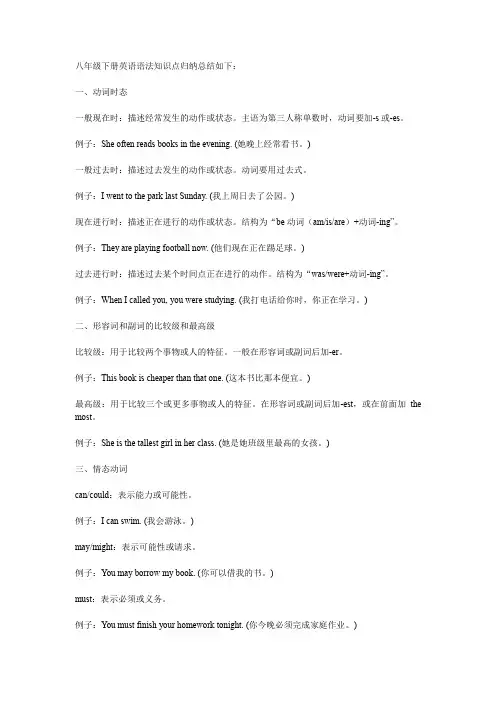
八年级下册英语语法知识点归纳总结如下:一、动词时态一般现在时:描述经常发生的动作或状态。
主语为第三人称单数时,动词要加-s或-es。
例子:She often reads books in the evening. (她晚上经常看书。
)一般过去时:描述过去发生的动作或状态。
动词要用过去式。
例子:I went to the park last Sunday. (我上周日去了公园。
)现在进行时:描述正在进行的动作或状态。
结构为“be动词(am/is/are)+动词-ing”。
例子:They are playing football now. (他们现在正在踢足球。
)过去进行时:描述过去某个时间点正在进行的动作。
结构为“was/were+动词-ing”。
例子:When I called you, you were studying. (我打电话给你时,你正在学习。
)二、形容词和副词的比较级和最高级比较级:用于比较两个事物或人的特征。
一般在形容词或副词后加-er。
例子:This book is cheaper than that one. (这本书比那本便宜。
)最高级:用于比较三个或更多事物或人的特征。
在形容词或副词后加-est,或在前面加the most。
例子:She is the tallest girl in her class. (她是她班级里最高的女孩。
)三、情态动词can/could:表示能力或可能性。
例子:I can swim. (我会游泳。
)may/might:表示可能性或请求。
例子:You may borrow my book. (你可以借我的书。
)must:表示必须或义务。
例子:You must finish your homework tonight. (你今晚必须完成家庭作业。
)四、被动语态被动语态用于描述事物的状态或描述被动发生的动作。
结构为“be动词(am/is/are/was/were)+动词的过去分词”。
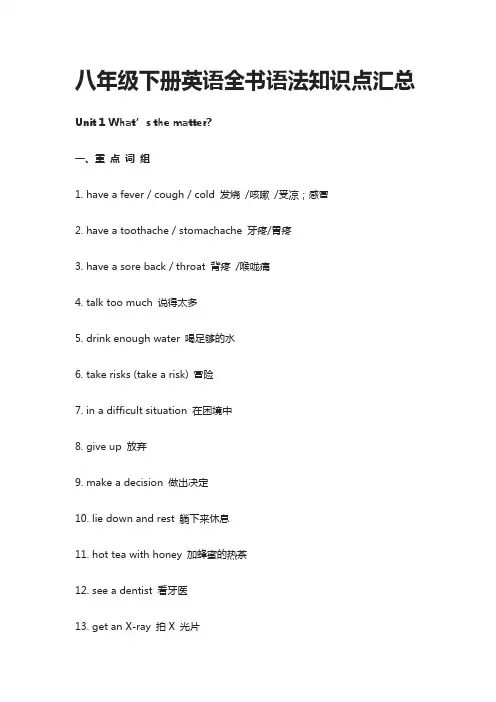
八年级下册英语全书语法知识点汇总Unit 1 What’s the matter?一、重点词组1. have a fever / cough / cold 发烧/咳嗽/受凉;感冒2. have a toothache / stomachache 牙疼/胃疼3. have a sore back / throat 背疼/喉咙痛4. talk too much 说得太多5. drink enough water 喝足够的水6. take risks (take a risk) 冒险7. in a difficult situation 在困境中8. give up 放弃9. make a decision 做出决定10. lie down and rest 躺下来休息11. hot tea with honey 加蜂蜜的热茶12. see a dentist 看牙医13. get an X-ray 拍X 光片14. take one’s temperature 量体温15. put some medicine on sth. 在……上面敷药16. feel very hot 感到很热17. sound like 听起来像18. all weekend 整个周末19. in the same way 以同样的方式20. go to a doctor 看医生21. go along 沿着……走22. on the side of the road 在马路边23. shout for help 大声呼救24. without thinking twice 没有多想25. get off 下车26. have a heart problem 有心脏病27. to one’s surprise 使……惊讶的;出乎……意料28. thanks to 多亏了;由于29. in time 及时30. save a life 挽救生命31. get into trouble 造成麻烦(或烦恼)32. right away 立刻;马上33. because of 由于34. get out of 离开;从……出来35. hurt oneself 受伤36. put a bandage on sth. 用绷带包扎37. fall down 摔倒38. feel sick 感到恶心39. have a nosebleed 流鼻血40. cut his knee 割伤他的膝盖41. put her head back 把她的头向后仰42. have problems breathing 呼吸困难43. mountain climbing 登山运动44. be used to doing sth. 习惯做某事45. run out (of) 用完;耗尽46. so that 以便47. so …that 如此……以至于……48. be in control of 掌管;管理49. keep on doing sth. 继续或坚持做某事二、重点句型1. What’s the matter? 怎么了?What’s the matter with you?= What’s the trouble with you?= What’s wrong with you? 你怎么了?2. What should she do? 她该怎么办呢?Should I take my temperature? 我该量一下体温吗?主语+ should/shouldn’t + 动词原形①You should lie down and rest. 你应该躺下休息一会儿。
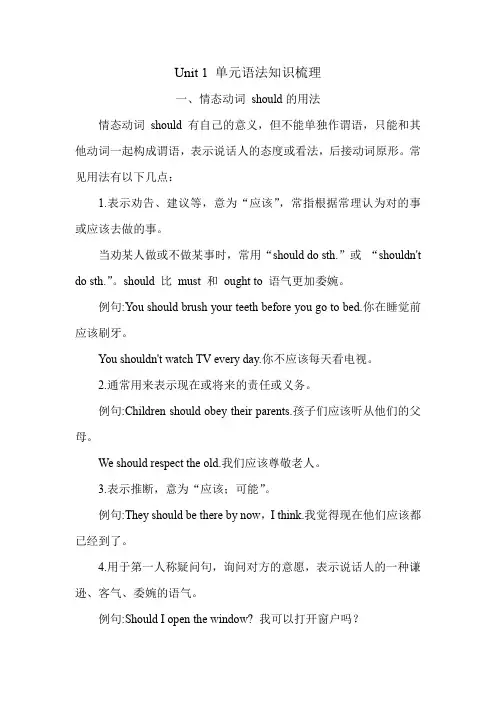
Unit 1 单元语法知识梳理一、情态动词should的用法情态动词should有自己的意义,但不能单独作谓语,只能和其他动词一起构成谓语,表示说话人的态度或看法,后接动词原形。
常见用法有以下几点:1.表示劝告、建议等,意为“应该”,常指根据常理认为对的事或应该去做的事。
当劝某人做或不做某事时,常用“should do sth.”或“shouldn't do sth.”。
should 比must 和ought to 语气更加委婉。
例句:You should brush your teeth before you go to bed.你在睡觉前应该刷牙。
You shouldn't watch TV every day.你不应该每天看电视。
2.通常用来表示现在或将来的责任或义务。
例句:Children should obey their parents.孩子们应该听从他们的父母。
We should respect the old.我们应该尊敬老人。
3.表示推断,意为“应该;可能”。
例句:They should be there by now,I think.我觉得现在他们应该都已经到了。
4.用于第一人称疑问句,询问对方的意愿,表示说话人的一种谦逊、客气、委婉的语气。
例句:Should I open the window? 我可以打开窗户吗?What should we do now? 我们现在该干什么呢?5.表示某种感情色彩,意为“竟会”,常用于以how, why开头引导的特殊疑问句中。
例句:Why should you be so early today? 你今天为什么会如此早?二、反身代词1.反身代词的构成反身代词是一种表示反射或强调的代词。
它由第一人称、第二人称的形容词性物主代词和第三人称代词的宾格加词尾-self或-selves构成。
其构成如下表:反身代词与它所指代的名词或代词形成互指关系,两者在人称和数上应保持一致。
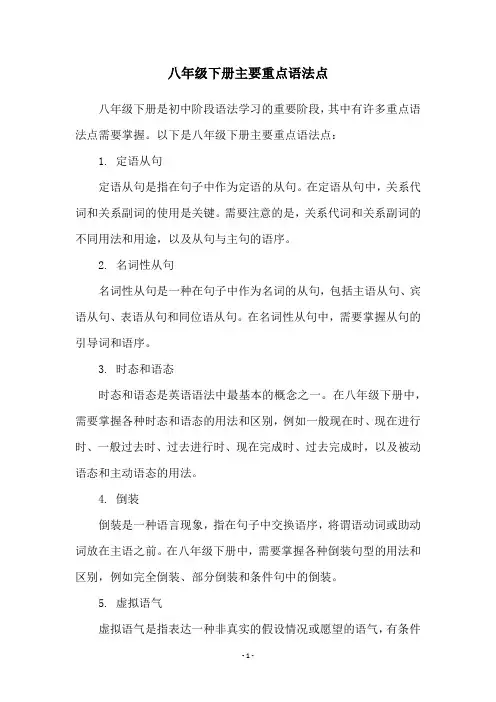
八年级下册主要重点语法点
八年级下册是初中阶段语法学习的重要阶段,其中有许多重点语法点需要掌握。
以下是八年级下册主要重点语法点:
1. 定语从句
定语从句是指在句子中作为定语的从句。
在定语从句中,关系代词和关系副词的使用是关键。
需要注意的是,关系代词和关系副词的不同用法和用途,以及从句与主句的语序。
2. 名词性从句
名词性从句是一种在句子中作为名词的从句,包括主语从句、宾语从句、表语从句和同位语从句。
在名词性从句中,需要掌握从句的引导词和语序。
3. 时态和语态
时态和语态是英语语法中最基本的概念之一。
在八年级下册中,需要掌握各种时态和语态的用法和区别,例如一般现在时、现在进行时、一般过去时、过去进行时、现在完成时、过去完成时,以及被动语态和主动语态的用法。
4. 倒装
倒装是一种语言现象,指在句子中交换语序,将谓语动词或助动词放在主语之前。
在八年级下册中,需要掌握各种倒装句型的用法和区别,例如完全倒装、部分倒装和条件句中的倒装。
5. 虚拟语气
虚拟语气是指表达一种非真实的假设情况或愿望的语气,有条件
虚拟语气、假设虚拟语气和愿望虚拟语气。
在八年级下册中,需要掌握虚拟语气的使用和特点。
6. 并列句和复合句
并列句是由两个或多个句子并列连接而成的句子,复合句是指由一个主句和一个或多个从句组成的句子。
在八年级下册中,需要掌握并列句和复合句的用法和特点,以及从句的种类和功能。
以上是八年级下册主要重点语法点的介绍,需要注意的是,语法学习需要不断地练习和巩固,只有通过不断地积累和运用,才能真正掌握语法知识。
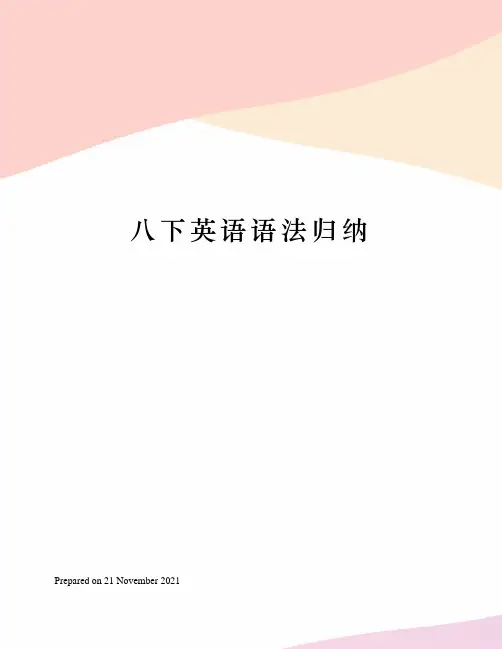
八下英语语法归纳Prepared on 21 November 2021新版八年级英语下册第一单元知识点归纳Unit 1 What’s the matter一、基础知识1. What’ s the matter 怎么啦出什么事情了【解析】matter/ ' mt(r)) /n.问题;事情What’ s the matter with you= What’s the trouble with you = What’ s wrong with you 你怎么了【注】: matter 和trouble 为名词,其前可加the 或形容词性物主代词,wrong 是adj. 不能加the【用法】用于询问某人有什么病或某人遇到什么麻烦、问题其后跟询问对象时,与介词with连用。
即:What’s the matter with sb. = What’s your trouble = What’s up = What happens to sb.—What’s the matter with you —I have a bad cold.2. I had a cold.我感冒了。
have a cold=catch a cold=have theflu感冒have a fever 发烧 have a cough咳嗽 have a stomachache胃疼,肚子疼 have a toothache牙疼 have a headache头疼3. 身体部位+ache(疼痛)构成新的复合词stomach+ache=stomachache head+ache=headachetooth+ache=toothache back+ache=backache后背痛4. much too+ 形容词,意为太...... ,too much+名词,意为很多,大量。
5. enough【形容、副词】足够的/地,enough放在名前后,形副后。
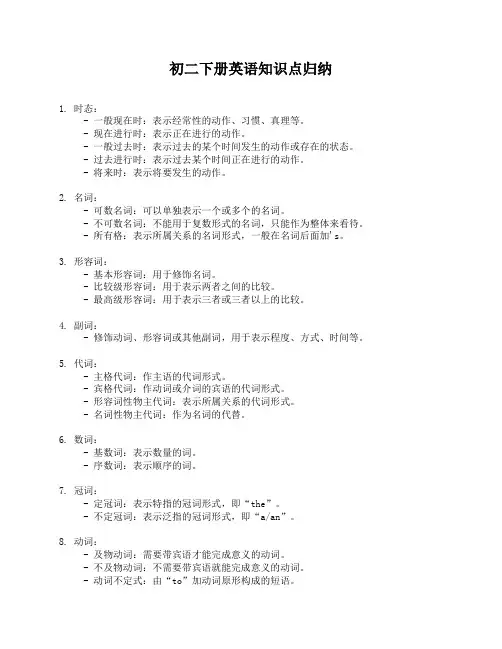
初二下册英语知识点归纳1. 时态:- 一般现在时:表示经常性的动作、习惯、真理等。
- 现在进行时:表示正在进行的动作。
- 一般过去时:表示过去的某个时间发生的动作或存在的状态。
- 过去进行时:表示过去某个时间正在进行的动作。
- 将来时:表示将要发生的动作。
2. 名词:- 可数名词:可以单独表示一个或多个的名词。
- 不可数名词:不能用于复数形式的名词,只能作为整体来看待。
- 所有格:表示所属关系的名词形式,一般在名词后面加's。
3. 形容词:- 基本形容词:用于修饰名词。
- 比较级形容词:用于表示两者之间的比较。
- 最高级形容词:用于表示三者或三者以上的比较。
4. 副词:- 修饰动词、形容词或其他副词,用于表示程度、方式、时间等。
5. 代词:- 主格代词:作主语的代词形式。
- 宾格代词:作动词或介词的宾语的代词形式。
- 形容词性物主代词:表示所属关系的代词形式。
- 名词性物主代词:作为名词的代替。
6. 数词:- 基数词:表示数量的词。
- 序数词:表示顺序的词。
7. 冠词:- 定冠词:表示特指的冠词形式,即“the”。
- 不定冠词:表示泛指的冠词形式,即“a/an”。
8. 动词:- 及物动词:需要带宾语才能完成意义的动词。
- 不及物动词:不需要带宾语就能完成意义的动词。
- 动词不定式:由“to”加动词原形构成的短语。
9. 介词:- 用于连接名词、代词或动词与其他词语的词。
10. 连词:- 表示并列关系的连词,如“and, but, or”等。
- 表示选择关系的连词,如“either…or, neither…nor”等。
- 表示因果关系的连词,如“because, so, therefore”等。
11. 疑问句:- 一般疑问句:以助动词、情态动词或be动词开头的陈述句,问句式为“助动词/情态动词/be动词+主语+谓语?”- 特殊疑问句:用特殊疑问词引导的疑问句,如“what, when, where, who, which, why, how”等。
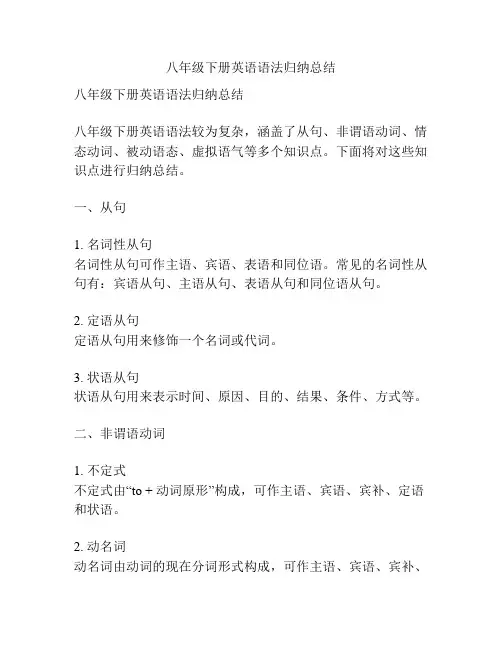
八年级下册英语语法归纳总结八年级下册英语语法归纳总结八年级下册英语语法较为复杂,涵盖了从句、非谓语动词、情态动词、被动语态、虚拟语气等多个知识点。
下面将对这些知识点进行归纳总结。
一、从句1. 名词性从句名词性从句可作主语、宾语、表语和同位语。
常见的名词性从句有:宾语从句、主语从句、表语从句和同位语从句。
2. 定语从句定语从句用来修饰一个名词或代词。
3. 状语从句状语从句用来表示时间、原因、目的、结果、条件、方式等。
二、非谓语动词1. 不定式不定式由“to + 动词原形”构成,可作主语、宾语、宾补、定语和状语。
2. 动名词动名词由动词的现在分词形式构成,可作主语、宾语、宾补、定语和状语。
3. 分词分词分为现在分词和过去分词。
现在分词以-ing结尾,常作定语和状语。
过去分词有规则变化和不规则变化,常作定语和宾补。
三、情态动词常见的情态动词有can、could、may、might、must、shall、should、will、would等。
情态动词用法灵活,表示能力、允许、推测、义务、愿望、建议等。
四、被动语态被动语态由“be + 过去分词”构成,表示主语是动作的承受者。
被动语态可用于各种时态和情态动词,还可以用在不定式、动名词和从句中。
五、虚拟语气虚拟语气用来表示与事实相反的假设、愿望、建议等。
常见的形式有虚拟条件句、虚拟语气与情态动词和虚拟语气用法。
以上是八年级下册英语语法的归纳总结,对于这些知识点,需要多加练习和深入理解。
通过不断的练习,掌握这些语法知识将对英语的学习和提高有很大的帮助。
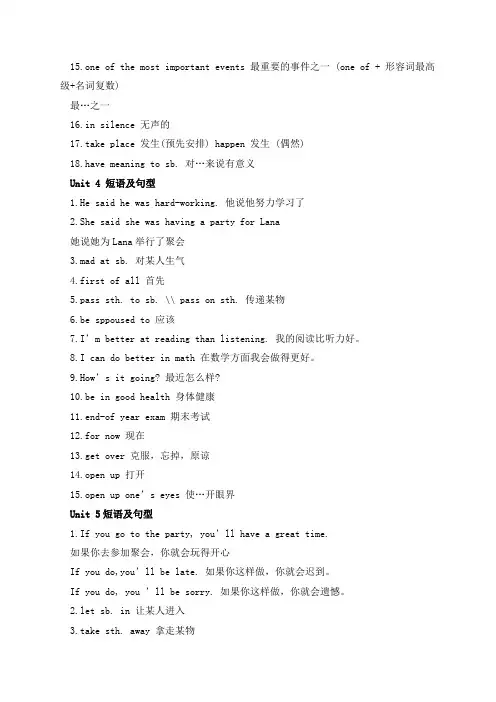
八年级下册英语知识点最全归纳Unit 1 短语及句型1.many\\much---- more + 可数或不可数名词更多few --- fewer + 可数名词更多little ----- less +不可数名词更少例如:more people、more pollution、less free time、less pollution、fewer cars、fewer trees2.there will be 将会有 There will be more people.将会有更多的人Will there be less pollution?会有更少的污染吗?Yes,there will.\\ No,there won’t.是,会有。
\\ 不,不会有。
3.be free 免费的4. on computers 在电脑上 on paper 在纸上5.live to be 活到 live to be 200 years old 活到200岁6.fall in love with sb.\\sth. 喜爱某人或某物7.live alone 单独居住8.on vacation 度假9.over and over again 一遍又一遍10.be the same as 与…一样be different from 与…不同unit 2 单词及短语1.What should I \\he\\she\\they\\you do? 我\\他\\她\\他们\\你该怎么办? You could write him a letter. 你可以给他写一封信。
2.argued with sb. 与某人争吵3.out of style 过时的 in style 时尚的4.a ticket to a ball game 一场球赛的票5.surprise sb. 使某人惊奇be surprised at sth. 对…感到惊奇to one’s surprise 令某人惊奇的事6.pay for 支付7.ask sb. for sth. 向某人要求某物ask sb. to do sth. 要求某人做某事8.have a bake sale 烧烤9.find out 发现,查明10.get on well with sb. 与某人相处得好11.have a fight with sb. 与某人争吵、打架12.not……until 直到…才13.it’s time for sth.\\it’s time to do sth. 做某事的时间到了14.under too much pressure 承受太多的压力15.take part in 参加,参与16.a mother of three 三个孩子的妈妈Unit 3 短语及句型1.What were you doing when the UFO arrived?当UFO到达时你在干什么?2.While the boy was walking down the street, the UFO landed. 当男孩在沿着街道走时,UFO降落了3.in front of 在…之前(外部整体前)in the front of (内部整体前)4.talk on the phone 在电话中交谈nd on the street 在街上降落6.walk down the street 沿着街道走7.take off (过去式 took off) 起飞8.around ten o’clock 大约10点9.You can imagine how strange it was!你可以想象它有多奇怪!10.Museum of Flight 飞行博物馆11.jump down 跳下来12.in a tree 在树上 on a tree 长在树上13.run away 跑开,逃跑14.say to sb. 对某人说15.one of the most important events 最重要的事件之一 (one of + 形容词最高级+名词复数)最…之一16.in silence 无声的17.take place 发生(预先安排) happen 发生 (偶然)18.have meaning to sb. 对…来说有意义Unit 4 短语及句型1.He said he was hard-working. 他说他努力学习了2.She said she was having a party for Lana她说她为Lana举行了聚会3.mad at sb. 对某人生气4.first of all 首先5.pass sth. to sb. \\ pass on sth. 传递某物6.be sppoused to 应该7.I’m better at reading than listening. 我的阅读比听力好。
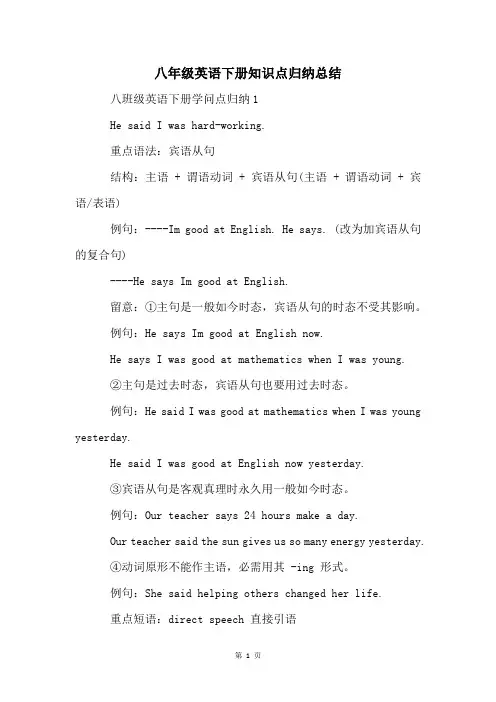
八年级英语下册知识点归纳总结八班级英语下册学问点归纳1He said I was hard-working.重点语法:宾语从句结构:主语 + 谓语动词 + 宾语从句(主语 + 谓语动词 + 宾语/表语)例句:----Im good at English. He says. (改为加宾语从句的复合句)----He says Im good at English.留意:①主句是一般如今时态,宾语从句的时态不受其影响。
例句:He says Im good at English now.He says I was good at mathematics when I was young.②主句是过去时态,宾语从句也要用过去时态。
例句:He said I was good at mathematics when I was young yesterday.He said I was good at English now yesterday.③宾语从句是客观真理时永久用一般如今时态。
例句:Our teacher says 24 hours make a day.Our teacher said the sun gives us so many energy yesterday.④动词原形不能作主语,必需用其 -ing 形式。
例句:She said helping others changed her life.重点短语:direct speech 直接引语reported speech = indirect speech 间接引语first of all = at first 首先pass on 传递be supposed to do sth. 应当做某事be good at = do well in 在某方面做得好in good health 身体健康get over 克服open up 打开care for = take care of = look after 照料;照看not any more = not any longer = no longer 不再have a cold 感冒end-of-year exam 年终考试get nervous 变得紧急forget to do sth. 遗忘做某事(该事未做)forget doing sth. 遗忘做某事(该事已做)its + adj. + [for sb.] + to do sth. 做某事[对某人来说](加形容词)context 上下文Reading Strategy(阅读方法)First read for meaning, not for detail. (首先理解文段的大致意思,不在于文段的详情部分。
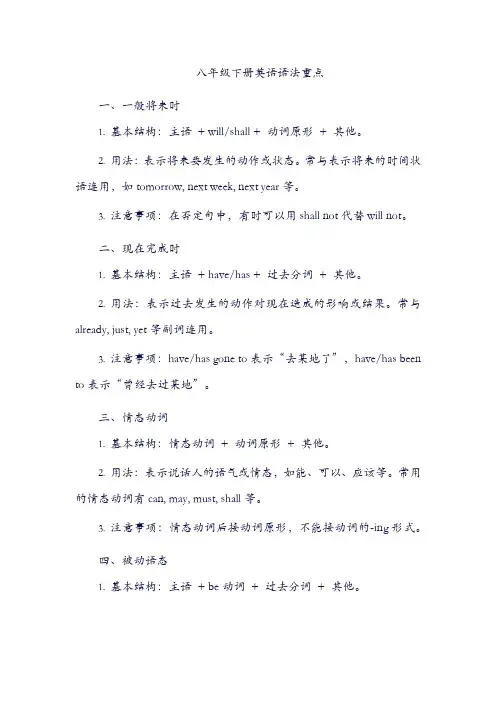
八年级下册英语语法重点一、一般将来时1.基本结构:主语+ will/shall + 动词原形+ 其他。
2.用法:表示将来要发生的动作或状态。
常与表示将来的时间状语连用,如tomorrow, next week, next year等。
3.注意事项:在否定句中,有时可以用shall not代替will not。
二、现在完成时1.基本结构:主语+ have/has + 过去分词+ 其他。
2.用法:表示过去发生的动作对现在造成的影响或结果。
常与already, just, yet等副词连用。
3.注意事项:have/has gone to表示“去某地了”,have/has been to表示“曾经去过某地”。
三、情态动词1.基本结构:情态动词+ 动词原形+ 其他。
2.用法:表示说话人的语气或情态,如能、可以、应该等。
常用的情态动词有can, may, must, shall等。
3.注意事项:情态动词后接动词原形,不能接动词的-ing形式。
四、被动语态1.基本结构:主语+ be动词+ 过去分词+ 其他。
2.用法:表示主语是动作的接受者。
常与by引导的方式状语连用,如by machine, by air等。
3.注意事项:被动语态的时态变化主要通过be动词的变化来实现,不同时态的被动语态需要注意与该时态的主动语态相对应。
五、不定代词和冠词用法1.不定代词:表示泛指或不确定的代词,如some, any, other等。
some用于肯定句,any用于否定句或疑问句;other表示“其他的”。
2.冠词:表示特指或泛指的词,分为定冠词the和不定冠词a/an。
a用于辅音音素开头的单词前,an用于元音音素开头的单词前;the 表示特指或上文提到的某个名词。
3.用法:不定代词和冠词一起使用时,可以构成限定词短语,如some books, the school gate等。
限定词短语可以修饰名词,表示特指或泛指的概念。
4.注意事项:在英语中,不定代词和冠词的使用是有规则和限制的,需要根据上下文和语境来判断使用哪个代词或冠词。
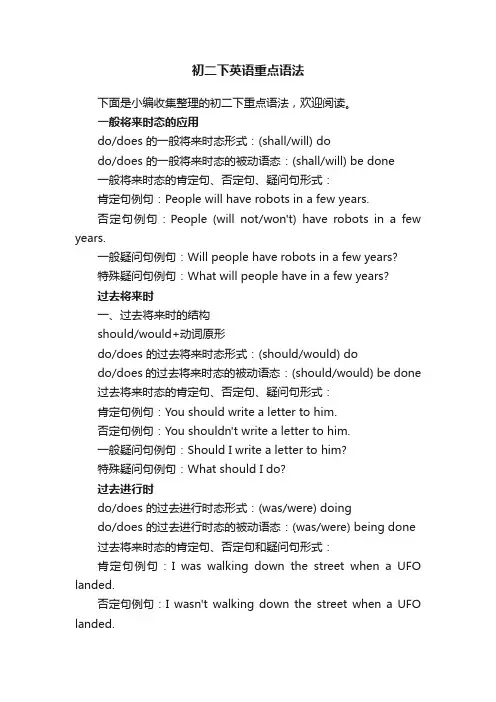
初二下英语重点语法下面是小编收集整理的初二下重点语法,欢迎阅读。
一般将来时态的应用do/does 的一般将来时态形式:(shall/will) dodo/does 的一般将来时态的被动语态:(shall/will) be done一般将来时态的肯定句、否定句、疑问句形式:肯定句例句:People will have robots in a few years.否定句例句:People (will not/won't) have robots in a few years.一般疑问句例句:Will people have robots in a few years?特殊疑问句例句:What will people have in a few years?过去将来时一、过去将来时的结构should/would+动词原形do/does 的过去将来时态形式:(should/would) dodo/does的过去将来时态的被动语态:(should/would) be done 过去将来时态的肯定句、否定句、疑问句形式:肯定句例句:You should write a letter to him.否定句例句:You shouldn't write a letter to him.一般疑问句例句:Should I write a letter to him?特殊疑问句例句:What should I do?过去进行时do/does 的过去进行时态形式:(was/were) doingdo/does 的过去进行时态的被动语态:(was/were) being done 过去将来时态的肯定句、否定句和疑问句形式:肯定句例句:I was walking down the street when a UFO landed.否定句例句:I wasn't walking down the street when a UFO landed.一般疑问句例句:Were you walking down the street when a UFO landed?特殊疑问句例句:What were you doing when a UFO landed?动词 when 和 while 的选择:when 后加瞬间动词,while 后加延续性动词。
八年级下册英语语法必看八年级下册英语语法的重点内容包括:
1. 时态与语态:
- 现在进行时:主语 + be动词 + 现在分词
- 一般过去时:主语 + 过去式动词
- 一般现在时:主语 + 动词原形
- 一般将来时:主语 + will + 动词原形
- 被动语态:主语 + be动词 + 过去分词
2. 比较级和最高级:
- 比较级的构成:主语 + 比较级 + than + 宾语
- 最高级的构成:主语 + the + 最高级 + of
3. 名词的单复数:
- 一般情况下,在名词后加-s表示复数形式
- 以s, x, sh, ch结尾的名词,在后面加-es表示复数形式
- 以辅音字母加y结尾的名词,变y为i,再加-es表示复数形式
4. 形容词和副词的比较级和最高级:
- 比较级的构成:原级 + er
- 最高级的构成:原级 + est
- 不规则形式:good-better-best, bad-worse-worst
5. 状语从句与定语从句:
- 状语从句:连词 + 从句
- 定语从句:关系词 + 从句
6. 直接引语和间接引语:
- 直接引语:用引号将原始对话内容包起来
- 间接引语:将原始对话内容改写为陈述句,并将引号去掉
7. 祈使句和感叹句:
- 祈使句:动词原形 + 宾语
- 感叹句:How + 形容词/副词 + 主语 + 动词!
以上是八年级下册英语语法的必看内容,希望对你有帮助!。
八年级下册英语笔记重点归纳一、Unit 1 What's the matter?1. 重点单词。
- matter n.问题;事情。
常用搭配:What's the matter (with sb.)?(某人)怎么了?- have a cold 感冒。
类似的表达还有:have a fever(发烧),have a cough (咳嗽)等。
- stomachache n.胃痛;腹痛。
“-ache”为后缀,表示疼痛,如:headache (头痛),toothache(牙痛)。
- foot n.脚,复数形式为feet。
- lie v.躺;平躺。
lie - lay - lain。
例如:You should lie down and rest.(你应该躺下休息。
)- rest v. n.放松;休息。
如:take a rest(休息一下)。
2. 重点短语。
- take one's temperature 量体温。
例如:The nurse took my temperature.(护士给我量了体温。
)- take breaks (take a break) 休息。
We should take breaks when we are tired.(当我们累的时候应该休息。
)- get off 下车。
He got off the bus at the next stop.(他在下一站下了公共汽车。
)- to one's surprise 使……惊讶的是;出乎……的意料。
To my surprise, he passed the exam.(令我惊讶的是,他通过了考试。
)- What should I do? 我应该做什么?用于询问建议。
- You should see a dentist and get an X - ray. 你应该去看牙医并且拍个X 光片。
should为情态动词,后接动词原形,表示建议。
英语八年级下册m1知识点英语八年级下册M1是说英语八年级下册的第一模块,这个模块主要是讲述了一些重要的知识点,在这里我们来一一了解一下。
一、动词时态动词时态是英语语言中非常重要的一部分,我们必须掌握好它。
动词时态包括:现在时、过去时和将来时。
现在时表示现在正在发生的事情,过去时表示已经发生了的事情,将来时表示将要发生的事情。
二、被动语态被动语态是一个非常常用的语法形式,它用于表示动作的承受者。
例如:这本书被我借走了。
在这个句子中,“这本书”是承受者,“我”是动作的执行者。
三、宾语从句宾语从句是一个包含在宾语中的子句,它常常作为主句的宾语。
例如:我知道他在做什么。
在这个句子中,“他在做什么”是宾语从句。
四、状语从句状语从句是一个包含在句子中的子句,它通常用来修饰句子中的动词,形容词或者副词。
例如:当我见到他时,他正在做功课。
在这个句子中,“当我见到他时”是状语从句。
五、比较级和最高级比较级和最高级是英语中用来比较两个或多个事物差异的基本形式。
比较级表示两个事物之间的大小或者差异,最高级用来表示三个或多个事物之间的大小或者差异。
六、情态动词情态动词是一组特殊的助动词,它们与其它动词搭配使用,用来表达肯定、否定、建议、请求、可能性、能力等。
例如:我可以帮助你。
在这个句子中,“可以”就是一个情态动词。
以上就是英语八年级下册M1的知识点总结。
我们如果掌握了这些语法规则,就能更好地学习英语,更好地理解和应用英语。
一、情态动词的用法情态动词+动词原形:表示对现在或将来的情况作推测。
情态动词+动词现在进行时:表示对现在正在发生的事情进行推测。
情态动词+动词完成时:表示对过去的情况进行推测。
情态动词+动词完成进行时:表示对过去正在发生事情的推测。
情态动词+动词不定式完成式:表示“本应当做某事而没做”。
情态动词的否定式:一般在后面加not。
二、形容词和副词的比较级和最高级的构成原级用“as…as”或“not as(so)…as”结构表示比较。
比较级用“than”结构表示比较。
最高级用“the+最高级+名词+表示范围的短语或从句”结构表示。
三、动词时态一般现在时:表示经常发生的动作或存在的状态,常与always,often,seldom,every day 等连用。
现在进行时:表示正在进行的动作,常与now连用。
过去进行时:表示过去某一时间正在进行的动作,常与at that time连用。
一般将来时:表示将来要发生的动作或存在的状态,常与tomorrow,next week等连用。
可以表示为“will/shall+动词原形”结构。
过去将来时:表示从过去某一时间看将要发生的动作或存在的状态,常与the next day,tomorrow等连用。
可以表示为“would/should+动词原形”结构。
现在完成时:表示过去发生的动作对现在造成的影响或结果,常与just now,already,yet 等连用。
结构为“have/has+动词的过去分词”。
过去完成时:表示过去某一时间或动作之前已经完成的动作或存在的状态,即“过去的过去”。
结构为“had+动词的过去分词”。
四、名词性从句和定语从句的用法名词性从句包括主语从句、宾语从句、表语从句和同位语从句。
引导这些从句的词有连词that、whether、if以及连接代词who、whom、whose、what、which和连接副词when、where、how、why等。
其中,that在句中无词义,只起连接作用;if、whether有词义,当“是否”“是不是”讲。
八年级下册英语语法知识点_英语语法知识点汇总八年级下册英语语法知识点_英语语法知识点汇总据最新了解,八年级下册英语语法知识点有哪些大家知道吗?为了方便大家学习借鉴,下面小编精心准备了八年级下册英语语法知识点内容,欢迎使用学习!八年级下册英语语法知识点Module 1一.固定词组1.a bit2.be done3.have a try4.in the middle5.hear from6.each other7.as well8.be proud of9.be good at 10a few 11.in the right way12.be excited about 13.help sb. with sth.14.shake hands with 15.talk with二.用法点拨1.would like + to do sth. 想做某件事 = want to do sth.2.I’m afraid ... 恐怕...3.Shall I ...? 我...吧?4.be sure + 句子确信... 主语是sb.5.Thanks for doing sth. 因做某事而感谢 = Thank you for doing sth.6.It + be +形容词 + to do sth. 做某事很...7.can’t to do sth. 迫不及待做某事8.how to do sth. 如何做某事9.be afraid of doing sth. 害怕做某事10.ask sb. (not) to do sth. 要求某人(不要)做某事11.much + 比较级 ...得多三.语法专项表示感觉,感官和知觉的连系动词:feel、look、smell、sound、taste__这些连系动词,后面通常接形容词Module 2一.固定词组1.lots of2.enter a competition3.first prize4.good luck5.think about6.a lot = very7.make up8.at the moment9.for example 10.be different from 11.so far 12.count down 13.by train14.have a wonderful time 15.find out二.用法点拨1.help sb. + do sth. 帮助某人做某事2.stop doing sth.停止做某事3.need(实意动词) + to do sth.4.Invite sb. + to do sth. 邀请某人做某事5.one of + the +形容词最高级+复数名词表示“最...之一”6.love doing sth. 喜爱做某事7.have been to + sw. 去过某地(但已经回来) have gone to + sw. 去了某地(现在没回来)8.begin to do sth. 开始做某事9.enjoy doing sth. 喜欢做某事10.learn to do sth. 学习做某事三.语法专项现在完成时:构成have/has + 动词过去分词__不规则动词需额外记忆。
以下是八年级下册英语的一些重要语法知识:
1. 现在完成时:表示过去发生的动作对现在造成的结果。
基本结构是“have/has + 过去分词”。
2. 过去进行时:表示在过去某一时刻或时间段内正在发
生的动作。
基本结构是“was/were + 动词的现在分词”。
3. 情态动词:表示说话人对某一动作的看法或态度。
常
用的情态动词有can、may、must、should等。
4. 动词不定式:表示某一动作的目的或计划。
基本结构
是“to + 动词原形”。
5. 被动语态:表示主语是动作的接受者。
基本结构是
“be + 动词的过去分词”。
6. 形容词的比较级和最高级:表示两个或多个事物之间
的相对大小或程度。
形容词的比较级和最高级有规则和不规
则两种形式。
7. 连词:连接两个或多个句子或子句,表示它们之间的
关系。
常用的连词有and、but、or、so等。
8. 介词:表示名词、代词等与句子其他成分之间的关系。
常用的介词有in、on、at、by等。
9. 祈使句:表示请求、命令或建议等。
基本结构是“动
词原形 + 感叹号”。
10. 条件状语从句:表示假设条件或未来的可能性。
基本
结构是“if + 从句主语 + 动词的一般现在时 + 主句”。
以上是八年级下册英语的一些重要语法知识,需要在学习
过程中重点掌握和运用。
初二英语下册重点语法梳理一.动词后接to do 和doing作宾语 A gerund (doing) is a verb that functions as noun. For example: a) I enjoy playing tennis. “I enjoy play tennis”is incorrect. b) We practice speaking English every day. c) They just bought a new swimming pool. In English the infinitive ( to do )is made of to and the verb. For example: a) I want to learn a new language. b) You forgot to close the door. (一)Verb + Gerund(doing) Here are some common verbs that can be followed by gerunds, but not infinitives. admit - He admitted taking the money. celebrate - We celebrated winning the competition. deny - The government denied spending too little on education. dislike - I dislike complaining. enjoy - She enjoys meeting her friends. finish - I finished working there last month. imagine - I imagine being a waitress is a difficult job. keep - Where are my keys? I keep losing them. mind - I don't mind waiting, we've got time. miss - I miss talking with my sisters. remember - Do you remember going to Italy? risk - Jeff's always late. He risks losing his job. stop - Don't stop singing, it's really nice. suggest - I suggest having lunch first. Notice: Gerunds are also used after some phrasal verbs. For example: If you keep on doing the same thing, you'll get the same results. She wants to give up drinking coffee. (二)Verb + Infinitive(to do) Below are some common verbs that can be followed by infinitives, but not usually gerunds. aim - I'm aiming to finish this book by the end of March. afford - I can't afford to buy new clothes. agree - My boss agreed to give me a reference. decide - We decided to have a baby. deserve - You deserve to have a better score. forget - Don't forget to lock the door. hope - I hope to go to Harvard Business School. learn - I learnt to read when I was 3 years old. mean - I'm sorry, I didn't mean to make you angry. need - You don't need to study a lot, you need to study a little for a long time. offer - He offered to help me carry these bags. plan - They plan to go abroad next year. pretend - He's pretending to be sick. promise - She promised to be here on time. refuse - Why do they always refuse to listen? seem - She seems to be really intelligent. 二.定语从句Relative clauses give information to help define something. For example: I work for a company. >>I work for a company that sells computer software. The clause "that sells computer software"gives extra information about the company. She likes people. >>She likes people who are kind and generous. The first sentence is too general, whereas the second sentence gives more information about who she likes. 不定代词:who /which的使用who Who clauses give information about people. For example: There are many people who want to learn English. A doctor is a person who helps sick people. Sometimes you can use that as well as “who”. For example: I like the man that lives next to us.I like the man who lives next to us. This is possible in Essential Relative Clauses, but not in Non-essential Relative Clauses. For more information see later units on Relative Clauses. which Which clauses give information about things. For example: Where's the pencil which was on my desk? He's moved to an apartment which has a nice view. “that” can be used instead of which especially in informal speech. For example: I'd like a job that has a higher salary. = I'dlike a job which has a higher salary. This is the book that I borrowed from Lisa. =This is the book which I borrowed from Lisa. Direction: Solve a puzzle Lee, Tracy, Sid and Kit are in love. Can you find who belongs together? Read the following clues and solve the puzzle. Clues: 1. Lee loves the person who speaks Spanish. 2. Tracy loves the person who tells amusing stories. 3. The teacher loves the writer. 4. The pilot loves the person who is interested in history. 5. Sid loves the person that plays the piano. 6. The person who tells amusing stories is a pilot. 7. The person that runs three miles a day is a doctor. 8. The person who plays the piano is a teacher. 9. The person who is interested in history is a doctor. 10. The doctor loves the person who tells amusing stories.11. The person who speaks Spanish is a writer. 12. The pilot loves the person who runs three miles a day. Keys: Lee loves Kit. Tracy loves Sid. 三.宾语从句Reported speech reports indirectly what another person said. For example: Jane said she was so happy today. The president said he needed a vacation. Reported speech usually uses the past form of direct speech. So if the direct speech is in the present, the reported speech is in the past. For example: Direct Speech - I said, "She is in her office."Reported Speech - I said she was in her office. Also if the direct speech is in the past, the reported speech uses the past perfect. Direct Speech - I said, "She was in her office at lunchtime."Reported Speech - I said she had been in her office at lunchtime. OR I said she was in her office at lunchtime. 直接引语变间接引语:a) I said, "She is busy". - I said she was busy. b) I said, "I am working now". - I said I was working now c) I said, "She was here this morning". - I said she was here this morning. OR I said she had been here this morning.d) I said "She was studying all yesterday"- I said she was studying all yesterday. OR I said she had been studying all yesterday e) I said, "She has worked here for 5 years."- I said she had worked here for 5 years. f) I said, "She had worked here for 5 years."- I said she had worked here for 5 years. g) I said, "She will work here from July."- I said she would work here from July. h) I said, "We'll be living here for 6 months."- I said we would be living here for 6 months.i) I said, "She can play the piano well."- I said she could play the piano well. 如果主句谓语动词为一般现在时,那么宾语从句的谓语动词的时态可以根据具体情况,该用哪种时态,就用哪种时态。